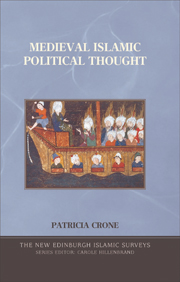Book contents
- Frontmatter
- Contents
- List of charts
- Preface
- Addenda and corrigenda
- I THE BEGINNINGS
- II THE WANING OF THE TRIBAL TRADITION, c. 700–900
- III COPING WITH A FRAGMENTED WORLD
- 12 INTRODUCTION
- 13 THE PERSIAN TRADITION AND ADVICE LITERATURE
- 14 THE GREEK TRADITION AND ‘POLITICAL SCIENCE’
- 15 THE ISMAILIS
- 16 THE SUNNIS
- IV GOVERNMENT AND SOCIETY
- Charts
- Bibliography, abbreviations, and conventions
- Index and glossary
14 - THE GREEK TRADITION AND ‘POLITICAL SCIENCE’
from III - COPING WITH A FRAGMENTED WORLD
Published online by Cambridge University Press: 05 August 2013
- Frontmatter
- Contents
- List of charts
- Preface
- Addenda and corrigenda
- I THE BEGINNINGS
- II THE WANING OF THE TRIBAL TRADITION, c. 700–900
- III COPING WITH A FRAGMENTED WORLD
- 12 INTRODUCTION
- 13 THE PERSIAN TRADITION AND ADVICE LITERATURE
- 14 THE GREEK TRADITION AND ‘POLITICAL SCIENCE’
- 15 THE ISMAILIS
- 16 THE SUNNIS
- IV GOVERNMENT AND SOCIETY
- Charts
- Bibliography, abbreviations, and conventions
- Index and glossary
Summary
The Greek tradition was less opaque to the early Muslims than the Persian, having long been Christian, but its role in Islamic culture was nonetheless more marginal, largely thanks to the fact that the Arabs only succeeded in conquering the eastern provinces of the Byzantine empire. Greeks were poorly represented in the caliphate. The metropolitan elite remained outside it, and their number was limited even at a provincial level, for many Greeks left Syria and Egypt when the Arabs took over: unlike the Persians, they still had an empire to go to. Of the educated men, Greek or non-Greek, who stayed behind, few were as steeped in imperial culture as their Persian and Persianized counterparts in Iraq, who had the Sasanid capital at their doorstep. Facility in Greek was of course required for a career in the local bureaucracies, and Syrian bureaucrats did play a role in the transmission of Greek political ideas under the Umayyads: it was a secretary of the caliph Hishām (724–43) who translated the Pseudo-Aristotelian letters to Alexander into Arabic. But the Syrian contribution was limited, and the Egyptians do not seem to have contributed at all. Paradoxically, it was overwhelmingly in Iraq, not in the former Byzantine provinces, that Greek learning resurfaced, and it did so in response to caliphal demand rather than pressure from Greek or Hellenized converts. What the translators made available was moreover the legacy of the ancient Greeks (al-yunāniyyūn, literally the Ionians), not the culture of the contemporary Byzantines (al-rūm, literally the Romans).
- Type
- Chapter
- Information
- Medieval Islamic Political Thought , pp. 165 - 196Publisher: Edinburgh University PressPrint publication year: 2004

